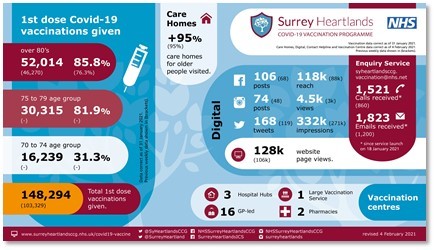I received this update yesterday from Surrey Heartlands:

Bad weather update
Snow and flood warnings are in place for parts of Surrey this weekend (6/7 February). Our Covid-19 vaccination services are currently expected to run as normal but if this changes we’ll share any updates on our website here. In case of adverse weather, we would ask people to travel safely and if they can’t attend, please don’t worry, we’ll be in touch to reschedule. For those attending, we would like to remind you (just in case of any queuing although this will be kept to a minimum) to:
- Dress warmly
- Try to arrive on time but not early
- If you are coming by car and are early, please stay in your car until close to your appointment time
- Bring a warm drink in a flask
Latest data
The latest published data here shows we have now delivered a total of 148,294 first dose vaccinations across Surrey Heartlands (up to 31 January). Our latest infographic below shows more detail; the graphic is also available on our website here.

In conversation with Dr Sally Johnson
Dr Sally Johnson, GP and clinical lead for our vaccination programme, answers lots of common questions and myth busts in this latest video which you can watch here. (Subtitles can be activated by clicking on the CC button along the bottom row of the video).
Latest FAQs
You can find a comprehensive set of FAQs on the local programme on our website here. In the meantime, we will regularly publish the answers to some of the most common/latest questions here.
How are you choosing who to vaccinate when?
We are currently offering the COVID-19 vaccine to people in JCVI priority groups 1 to 4. We are hoping to complete these priority groups by the middle of February. These include:
- all those 80 years of age and over
- we are proactively contacting anyone who has not yet been vaccinated by telephoning and writing to them. We are reviewing all GP lists to ensure we have not missed anyone
- frontline health and social care workers
- all those 75 years of age and over
- all those 70 years of age and over and clinically extremely vulnerable individuals.
- People with the following conditions are automatically deemed clinically extremely vulnerable:
- solid organ transplant recipients
- people with specific cancers
- people with cancer who are undergoing active chemotherapy
- people with lung cancer who are undergoing radical radiotherapy
- people with cancers of the blood or bone marrow such as leukaemia, lymphoma or myeloma who are at any stage of treatment
- people having immunotherapy or other continuing antibody treatments for cancer
- people having other targeted cancer treatments that can affect the immune system, such as protein kinase inhibitors or PARP inhibitors
- people who have had bone marrow or stem cell transplants in the last 6 months or who are still taking immunosuppression drugs
- people with severe respiratory conditions including all cystic fibrosis, severe asthma and severe chronic obstructive pulmonary disease (COPD)
- people with rare diseases that significantly increase the risk of infections (such as severe combined immunodeficiency (SCID), homozygous sickle cell disease)
- people on immunosuppression therapies sufficient to significantly increase risk of infection
- problems with your spleen, for example splenectomy (having your spleen removed)
- adults with Down’s Syndrome
- adults on dialysis or with chronic kidney disease (stage 5)
- women who are pregnant with significant heart disease, congenital or acquired
- other people who have also been classed as clinically extremely vulnerable, based on clinical judgement and an assessment of their needs. GPs and hospital clinicians have been provided with guidance to support these decisions
- If someone considers themselves to be clinically extremely vulnerable but their clinical condition is not included in the list above, they are advised to contact their GP or specialist to discuss.
- People with the following conditions are automatically deemed clinically extremely vulnerable:
Useful links
